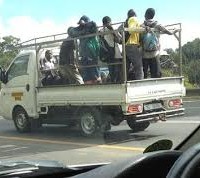Transport & Logistics

The purpose of a transport and logistics firm is to store and deliver other business’ products. Your business could specialize in the import and export of goods in and out of South Africa and other countries in Africa, or may concentrate on ground transportation within South Africa and border destinations. Whether shipping, trucking or conducting air transportation, a successful logistics company will need to have some means of freight transportation at its disposal, which could make a start-up logistics firm an expensive investment.
However, a transport and logistics service can be a very lucrative business provided you have good organizational and management skills. Firstly, think of what equipment you will need to invest in that would help your small business grow and remain competitive. Identify what equipment will be the most in demand by your target market. For example, if construction equipment will attract more customers then you will need to invest in standard equipment such as carts, cranes, forklifts, trucks, trailers, ramps, and others; but if your market research shows that commercial manufacturers (factories) will be your main clients then you will need to invest in machinery such as sorters, racking, forklifts, and packaging equipment. The mining industry is a viable sector to explore. You will need to find the right location to accommodate your equipment in a secure enclosure and warehouse. Before starting your company, you first need to establish a brand identity; make sure that your business is easily distinguishable from other similar logistics companies. This can be done in many different ways. Opt to offer unique services. You should also strive to become known as the company that offers budget products that are truly high-quality. Your chief objective should be to find your niche in this business by building a close relationship with your customers.
- Build good relationships with manufacturers, storage firms, customs agents, and buyers. Your job will be to schedule the movement of goods from factory to storage through customs checks to final customer distribution by truck or rail. You will need to acquire a thorough knowledge of what these firms do, how each differentiates itself and chooses a specialty. It is important to develop a support network for breakdowns and accidents and key contacts at the border. It is also critical to build a solid relationship with clients, and constantly re-affirm their expectations.
- Increased Competition among transport operators for existing volumes — exacerbated by inflationary costs [including volatile fuel prices, toll costs, stricter carbon emission requirements] — results in price wars to maintain [and grow] their position within the industry.
- Common problems facing transport operators moving products from South Africa to neighboring countries include costly lack of policies, poor coordination among government departments and their agencies, long offloading turnaround times for line-haul vehicles, border delays, corrupt officials [also, too few trained officials], poor road conditions and infrastructure, poor communication channels, inexperienced drivers [driving across country and across the border is often hazardous for the driver handling heavy duty haulage, which could lead to breakdowns or accidents], complicated border documentation and processes [lack of standardization of documentation between regional governments and relevant authorities], and costly permits and high insurance premiums. High vehicle maintenance costs also place a heavy burden on national rail operators.
- Successful management of cross border transport operations include focused project management, trained and experienced operational personnel with highly skilled drivers, and be well-versed in all aspects of risk management and real cost forecast, and a forward-thinking business philosophy to generate continual improvement. It is wise to invest heavily in stringent driver screening and employment processes, supported by ongoing driver training and management.
- If you are conversant in local languages or have business contacts in different parts of South Africa or the rest of the African continent this would greatly leverage your position to start your own transport and logistics firm. Research what the South Africa’s Department of Trade and Industry (DTI) offers new entrepreneurs in the form of training, grants and incentives. Identify established trade companies, and importers and exporters who you can approach to offer your services. Prepare an informative brochure and business cards to leave with potential clients.
- Gain practical experience and credibility within the industry. Before starting you own logistics company it is wise to gain work experience in the field to learn the complexities of the business. It will also help you establish networks with companies and gain credibility with prospective clients.
- Apply your experience and connections. Start your firm in the field you are best qualified in. However, if it is your intention to eventually expand your portfolio to include other specialized services such as import/export then you should be committed to acquiring comprehensive knowledge and firm connections in relevant regions; this may require you to work overseas to gain insight into the way foreign logistics operate.
- Obtain funding. In order to obtain the required capital needed to launch your business, you will need a comprehensive business plan when approaching potential investors. It is important to illustrate how your company will turn a profit. Include realistic financial projections based on your market research. Commercial banks are one potential source of start-up capital; also liaise with the DTI to apply for a low-interest loan for entrepreneurs starting their own transport and logistics business, particularly if you plan to handle exports.
- Acquire relevant equipment. After you have obtained the capital necessary to start your logistics firm, you will need to purchase (rent, or lease) loading equipment, vehicles and trailers capable of moving large quantities of freight such as planes, ships or trucks.
- Obtain licenses and permits. You will need to be licensed to operate this business. You will also need permits, depending on the type of load you are hauling, destination, and so forth. Contact the DTI for information.
Contact Theresa (ecottage@gmail.com) to create a Business Plan for your Transport and Logistics business; also to design a brochure and business card.




